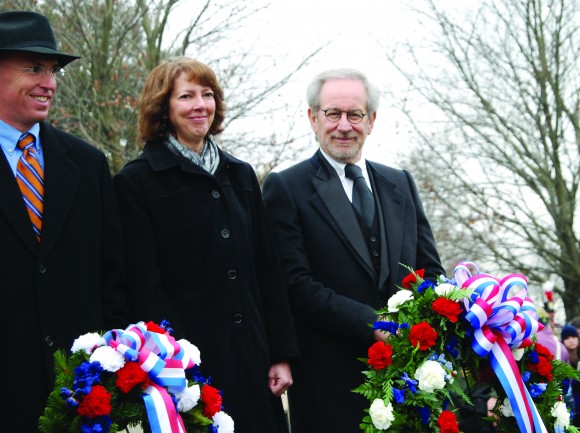Spielberg speaks at annual Dedication Day ceremony

Gettysburg College President Janet Morgan Riggs stands with director Steven Spielberg at the 149th annual Dedication Day ceremony. (Photo by Shawna Sherrell. For more photos, see Gettysburg College’s Flikr page)
By Brendan Raleigh, Staff Writer
Steven Spielberg, the director of such films as “Schindler’s List” and “Saving Private Ryan,” visited Gettysburg to deliver the keynote speech for the town’s annual Dedication Day ceremony, which honored the 149th anniversary of Abraham Lincoln’s Gettysburg Address.
The event was hosted at the Soldiers’ National Cemetery on Nov. 19 and sponsored by the Lincoln Fellowship of Pennsylvania, Gettysburg National Military Park, Gettysburg College and the Gettysburg Foundation.
Preceded by speakers as prominent as Presidents Harry Truman and Dwight D. Eisenhower, Spielberg seemed an exceedingly appropriate speaker given his most recent work, “Lincoln,” a historical drama about the life and death of America’s sixteenth president. The extensive research done for the biopic provided Spielberg with specific and in-depth knowledge of the historic event and its speaker.
The director specifically credited historian Doris Kearns Goodwin as one of the prime contributors to the film’s stellar historical accuracy, thanking her for providing him and his crew with “a luminous and true and magnificently constructed account of [Lincoln’s life].”
Standing at the podium atop the cemetery’s rostrum, Spielberg relentlessly praised Lincoln’s address, describing it as “the most perfect prose poem ever penned by an American” and citing it as a product of the former president’s “best and truest voice.”
Spielberg then discussed the historical significance of the town of Gettysburg, saying “all the glory and all the tragedy we associate with the Civil War resides most palpably, most indelibly here.”
Becoming even broader in scope, he then discussed the implications of the entire war and the importance of history itself, explaining “equality was the proposition the Civil War was meant to test” and “history lights the path toward injustice. Without history there is no hope.”
Spielberg closed his speech with an examination of the themes of life and death that were present in Lincoln’s Gettysburg Address and Second Inaugural Address, interpreting Lincoln’s words not to mean the point of life is “merely that we die,” but that the ascertainment of that meaning is the grandest and most important task presented before humanity.
Thanking his crew and the audience, he then yielded the podium to Joanne Hanley, the President of the Gettysburg Foundation, although not before receiving a standing ovation from thousands of cheering audience members.
Becky Tims, a Marylander who traveled to Gettysburg to hear Spielberg’s speech, approved highly of the filmmaker’s t nuggets of wisdom spread throughout the speech, explaining, “It was an interesting turn on what I expected. I liked what he had to say about how ‘there is no hope about history’ and how you have to learn from the past. You can’t forget the past.”
Following Hanley’s presentation of a portrait of Abraham Lincoln by artist Wendy Allen to Doris Kearns Goodwin, Lincoln re-enactor Jim Getty delivered the Gettysburg Address in the very place the same speech had been given 149 years before.
Subsequent notable aspects of the ceremony included the naturalization of 16 immigrants from 11 different countries across the world, the Gettysburg High School’s Brass Band’s rendition of “America the Beautiful” and a benediction by Gettysburg College Chaplain Joseph A. Donnella.
The ceremonies closed just as the sun peaked out from behind the clouds to the playing of “Taps” by a lone bugler, honoring all those who had fallen so many years ago.
